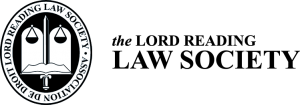NEWSLETTER – January 2018
President’s Message
David Ettedgui
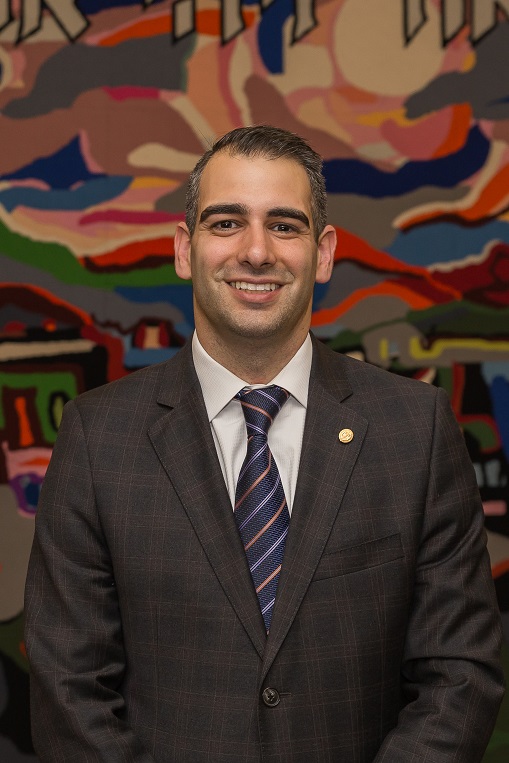
Dear Colleagues, Honourable Judges, and Friends of the Society,
Happy New Year!
I hope that 2018 will be a year of good health, joy and prosperity.
Our next lecture will take place on January 24th, 2018 and we are pleased to welcome Mtre. Lynne Roiter, President and CEO of Loto-Québec. Mtre. Roiter, the first woman to hold the post, will be interviewed on stage by Mtre. Sandra Abitan, Managing Partner of Osler's Montreal office.
This evening is our Annual Students Dinner when we host stagiaires and bar students, and present The Lord Reading Law Society's academic prizes to the deserving winners. The award winners, as well as representatives from each of the law faculties, will be present at the dinner lecture and we look forward to welcoming them.
The Justice Minister of Quebec, Stéphanie Vallée, will also address the audience and present the second annual Justice Minister’s Lord Reading Law Society prizes to a deserving lawyer and a deserving law student.
I would like to thank our dinner sponsor Mitchell Gattuso for their generous support.
You can register using the links at the left of this page. If you are a student or stagiaire find out about the special prices (in some cases free!) and special registration on our Facebook page.
Please join me at the Student Dinner to welcome the students and stagiaires. I look forward to seeing you!
Sincerely,
David Ettedgui
President
—–
Supreme Views: U.S. and Canadian Perspectives
Larry Markowitz
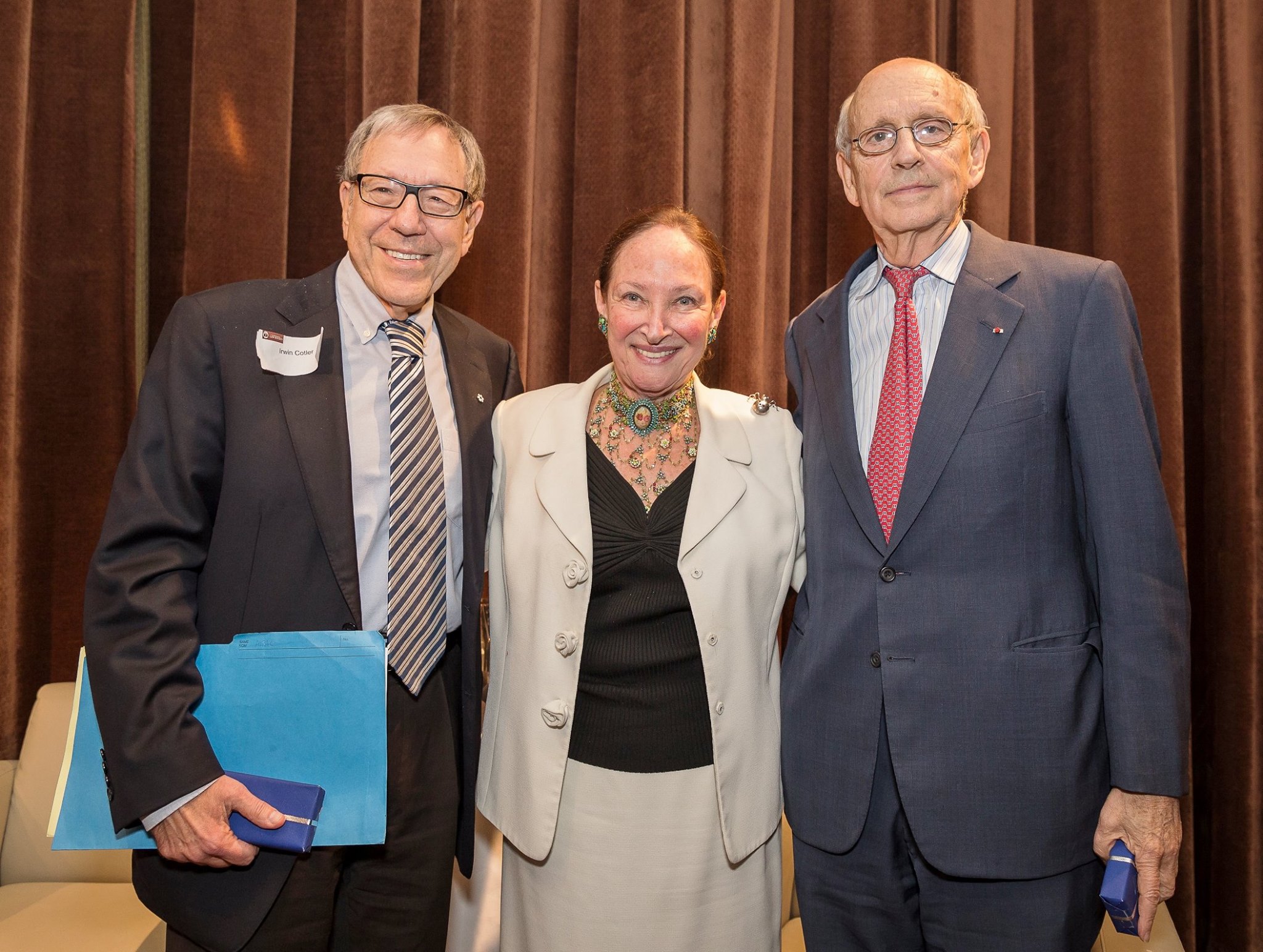
(for more photos from the memorable evening, please visit our Facebook page)
October 25, 2017 will go down in the annals of the Lord Reading Law Society as one of its most memorable evenings. On this historic occasion, our stage was graced by not one, but two Supreme Court justices – and from the highest court of not one, but two countries! And to top it off, our honourable guests' “fireside chat” was moderated by a world famous human rights advocate (and Canada’s former justice minister).
Justices Rosalie Abella and Stephen G. Breyer were joined on stage by the Honourable Irwin Cotler for a freewheeling and occasionally contentious, but always friendly, discussion highlighting the differences between the Canadian and American systems of justice. Kept in rapt attention throughout was an audience of 500 that included so many prominent jurists, diplomats and business people that Justice Abella was led to joke that “495 of them [were] seated at the head table!”
Topics covered in the 80-minute discussion included an overview of current challenges faced by the two nations' respective Supreme Courts, the differing approaches of Canada and the United States to freedom of speech and the appointment of judges, and the influence of foreign law on Supreme Court decisions, as well as insider views on partisanship (or the lack thereof) within each country's group of nine Supreme Court justices.
Although the evening proceeded mainly in English, our speakers occasionally switched to French, including notably our American panelist, Justice Breyer, who demonstrated an impressive fluency in the language of Molière.
Following an introduction by dinner chair and Society past president Ian M. Solloway, our moderator Professor Cotler opened up the proceedings by remarking that his friend (and 2016 Lord Reading guest speaker) Alan Dershowitz had, one week earlier, described Justices Abella and Breyer as "two of the most outstanding jurists in the world today". We knew we were in for a treat!
Current Challenges
In this era of "black swans", when unpredictable events, rising populism and identity politics have combined to make the role of judge ever more difficult, our panelists discussed the main challenges currently facing their respective Courts.
Brandishing a copy of the US Constitution that he keeps in his inside jacket pocket, Justice Breyer told us that while the simple version of what he does as a Justice of the Court is "interpreting statutes", the task at hand is not always easy: The meanings of some legal terms are not self-evident – notably the word “Liberty". To interpret such concepts, the Court must look to the history of the statute, legal traditions, consequences of a potential decision, value and purpose, what the drafters of the statute had in mind and, of course, precedent.
In Canada, our Charter of Rights and Freedoms only dates back to 1982, when we essentially started with a "blank slate". The United States’ highest court, in contrast, has over 200 years of precedent to consider. Canada’s highest court often has the advantage of being able to benefit from the experience of the US Supreme Court.
However, on some rights-related topics, our countries’ respective approaches differ. In matters of freedom of speech, for example, we have Section 1's balancing provision, whereby the harm caused by the limitation of a fundamental right must be balanced against the legislator’s objective in passing the legislation that is under review.
Thus the United States is more of a free marketplace of ideas, while Canadian law allows freedom of speech to be limited when that speech slides into the realm of “hate propaganda”.
Justice Abella pointed out that the United States focuses on civil libertarianism, which basically means "keeping the state away", while Canada's legal system focuses more on human-rights-related concepts such as multiculturalism, which invoke a role to be played by the state.
The Constitution of Canada is meant to protect the vulnerable, said Justice Abella, while also allowing for freedom of speech. The most vulnerable don't have access to the same platforms "as we do" to debate in the marketplace of ideas, and the Canadian Charter recognizes this by insisting on the balancing provision of Section 1.
In contrast, pointed out Justice Breyer, the United States law in this regard is clear: As Voltaire wrote, "I may hate what you say, but I will defend to the death your right to say it".
The Influence of Foreign Law
Once it became clear that the Canadian and US approaches to free speech differ, Professor Cotler changed the topic of conversation by asking our two guest justices what influence foreign judgments have on their courts.
When Justice Breyer was name to the Supreme Court of the United States some 23 years ago, maybe three or four of the 80-odd cases decided by the Court each year would refer to foreign jurisprudence. Nowadays, in an increasingly globalized world, 15 to 20 percent of his Court’s decisions refer to foreign law. After all, issues such as copyright or balancing the fight against terrorism with the right to be protected against intrusions on one's civil liberties are issues that are being dealt with by the courts of all developed nations, so it is only reasonable that other countries’ approaches be considered.
As an illustration, Justice Breyer cited Israel's approach to dealing with detained terrorist suspects as being a potentially helpful reference point in Guantanamo-Bay-prisoner-related cases.
As the Roman statesman Cicero wrote, “in times of war, the law falls silent”. It is thus helpful to look to the approaches of other democracies. After all, a judge is a human being, not one who can divine the absolute truth.
Justice Breyer also pointed out that the United States is a signatory to numerous international treaties and so even an obscure body like the “International Olive Council” can effectively write US laws. It is therefore only natural that US courts look at how other member states of the International Olive Council (to cite this obscure example) have interpreted the relevant treaty provisions.
Despite the points Justice Breyer made, the influence of foreign laws and courts decisions on US court cases remains controversial.
In contrast, in Canada, we are more accustomed to citing foreign jurisprudence. As Justice Abella pointed out, we are a bi-juridical country, with both common law and civil law influences built into our system. Also, our Charter of Rights and Freedoms states from the outset – at Section 1 – that we should look to "free and democratic societ(ies)" as influences, so there is no debate when our courts cite jurisprudence emanating from outside our borders. "It's in our DNA", said Justice Abella.
Partisanship on the Court
To close out the evening, Professor Cotler raised the perceived partisanship of the US Supreme Court as a topic for discussion. Justice Breyer pointed out that, contrary to the impression we may get from the media, he and his fellow Justices think of themselves as judges with a job to do, rather than as Republicans or Democrats. Indeed, only some 20 percent of cases are decided with a 5-to-4 split. And even then, it is not necessarily the same five or four judges on each side each time.
Also, sometimes a US President will name a Supreme Court judge and that justice will go on to decide key cases differently than the nominating President might have anticipated. For example, President Dwight D. Eisenhower named Justice Earl Warren, who as Attorney General of California was the moving force behind Japanese internment during World War II. Warren might have been expected to protect segregationist laws, but instead wrote the seminal Brown v. Board of Education decision in which he famously declared that “in the field of public education the doctrine of ‘separate but equal’ has no place”.
That said, continued Justice Breyer, "I've lived the life I've lived. I can't jump out of my own skin". A judge's basic worldview is determined from their upbringing and is unlikely to change fundamentally after they've been appointed to the Court.
In Canada, as well, the various Supreme Court judges obviously have different worldviews, said Justice Abella. However, Supreme Court justices are chosen differently here. Effectively, the choice of any given Supreme Court judge will have been influenced by members of both the Liberal and Conservative parties, as well as others.
Our two panelists agreed that a judge needs to approach their role with an open mind: Ideologies can be overruled when a judge listens with an open mind. The key is civility. As Justice Breyer remarked, in all his years on the Court, he has never heard voices raised in anger among the nine justices. That observation was comforting to hear!
Justice Abella referred to Justices Bertha Wilson and Brian Dickson, who were on the Supreme Court when the Charter came into being, as the "Fred and Ginger of the Charter". Their spirit of open debate and integrity continues to influence the functioning of our country's highest court – another comforting thought!
“To Rosalie Abella, we present this 'anti-dissent' pen”
The evening's program concluded with Quebec Court of Appeal Justice Nicholas Kasirer's elaborate, creative and entertaining thanking of our guest speakers and his presentation of a Lord Reading Law Society commemorative “writing instrument” (i.e., a pen) to each – a fitting tribute to an all-star panel that had entertained us, informed us and provided us with thought-provoking discourse on this memorable evening.
—–
CLE Breakfast – The Impact on Professionals of Tax Reform Proposals Regarding Private Corporations
Larry Markowitz
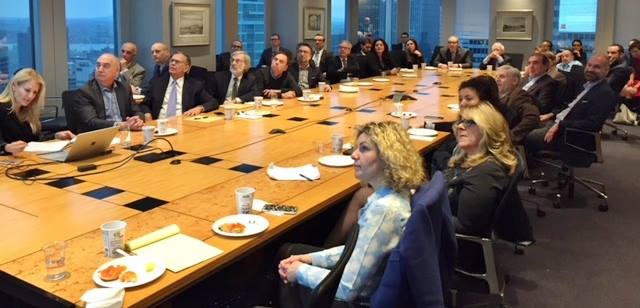
You may recall farmers, doctors – and even some lawyers – rising up in arms against Finance Minister Bill Morneau’s tax proposals last summer – only to be met with a whole new set of proposals in the autumn that would seemingly anger only a more restricted group of Canadians.
What was that all about?
On Tuesday, December 5th, the Lord Reading Law Society held its first Members-only CLE Breakfast of the season in the main boardroom of Davies Ward Phillips & Vineberg LLP.
We were pleased to welcome special guest speakers Rhonda Rudick and Reuben Abitbol, tax lawyers at Davies, who spoke before a packed house on “The Impact on Professionals of Tax Reform Proposals Regarding Private Corporations”.
Following a tasty breakfast of bagels, lox and cream cheese, the audience listened intently as Me Rudick and Me Abitbol examined the potential impacts of the federal government’s new tax proposals on private corporations, income sprinkling and the taxation of professionals’ work in process.
In particular, the prospective changes to the tax treatment of professionals’ work in process had several of those in attendance rushing back to their offices to create professional corporations…
This was our third-ever Members-only CLE Breakfast – a hugely successful concept we instituted only last year – demonstrating once again that “membership (in LRLS) has its privileges!”
(for more pictures from the breakfast, please visit our Facebook page)
—–
Goodbye and Thanks, Ziv
Allen Mendelsohn
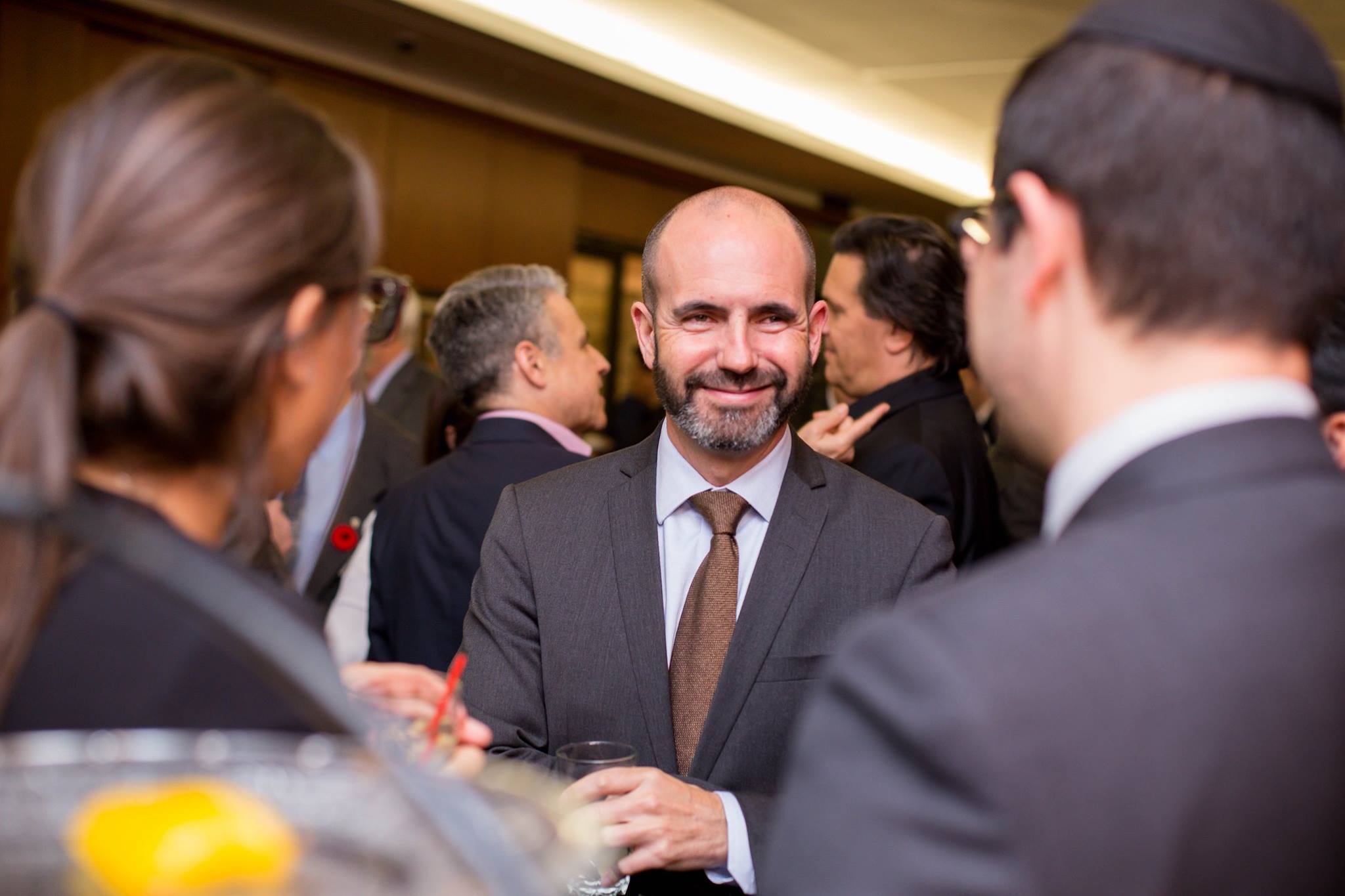
Israeli Consul General for Quebec and the Atlantic Provinces Ziv Nevo Kulman recently departed Montreal, ending his mission early to take up the position of head the cultural diplomacy bureau of the Foreign Affairs Ministry in Jerusalem.
Mr. Nevo Kulman was a good friend to the Society. He enthusiastically supported our work and events, and helped to foster closer ties between Lord Reading and the legal community in Israel.
We thank Ziv for everything he did for us and the community generally, and wish him all the best in his new position and in all the great things he will do in the future.
—–
Events of Interest
Allen Mendelsohn
We thought you might like to know about some upcoming events that may be of interest to our members and friends:
- This Friday, January 19th, L'Association des étudiants juifs en droit de l'Université de Montréal has their Souper de Shabbat, featuring the Honourable Justice Morris Fish. Details can be found on their Facebok page;
- There is a Special Program for attorneys and justices to participate in the 30th Anniversary International March of the Living, April 10-15 in Poland. For more information please visit the website.
—–
Society Humour
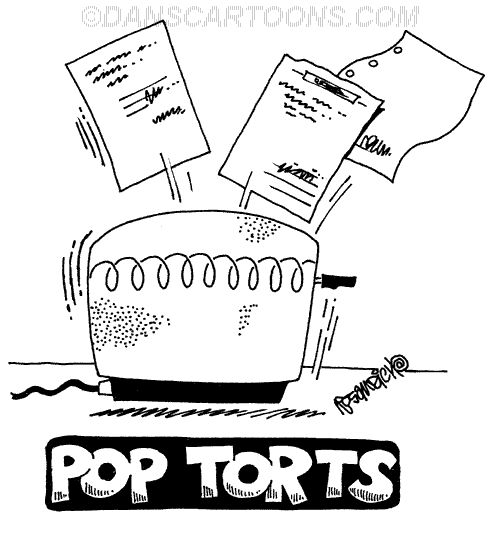
—–
News from the Mishpacha
Mazel Tov
- To Society Past President Casper Bloom on being elected to the position of Vice-President from the English-speaking community of the Québec Liberal Party
Condolences
- To Society Past President Irwin Rudick and Society member Rhonda Rudick, on the loss of their mother and grandmother Freda



